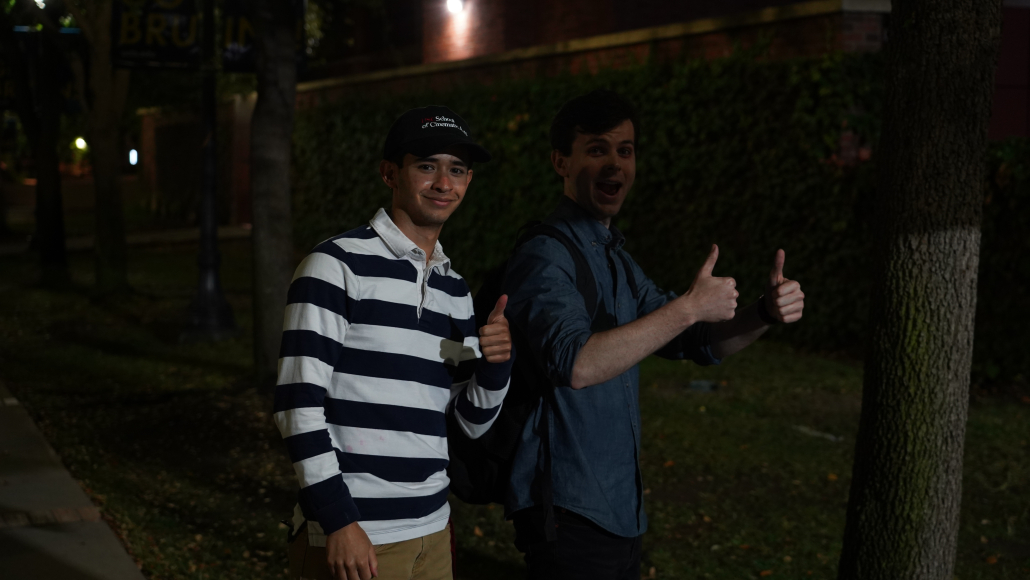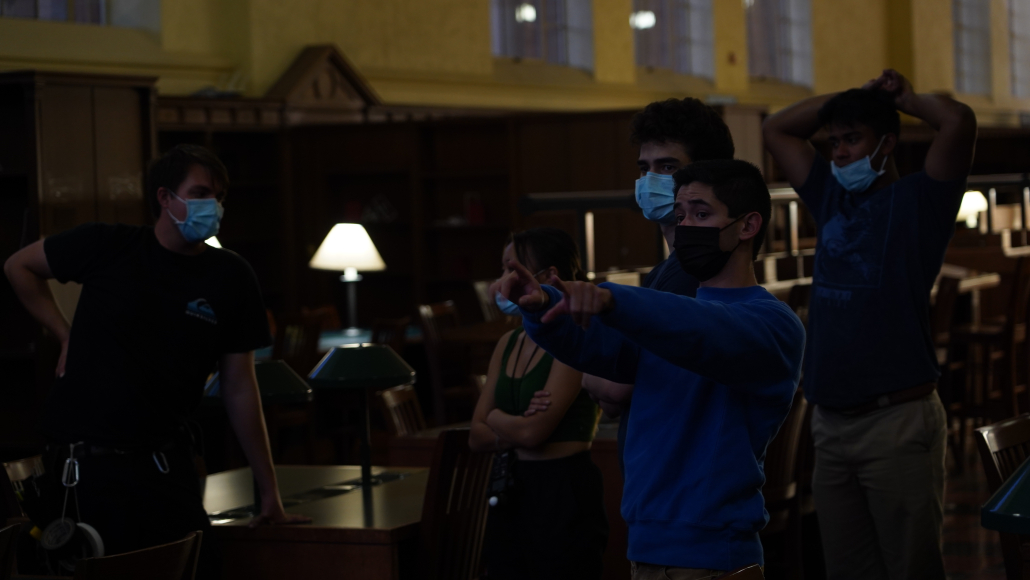‘The Undergraduate’ explores mental health in college

What happens when the metric that is used to measure expectations for a certain experience could not be more off base? Enter depictions of college life in film — the plots of well-received classics like “National Lampoon’s Animal House,” “The House Bunny” and “American Pie” hinge on themes of partying and gratification for their popularity.
Everyone loves a raunchy and raucous college movie, but disappointment is in store for those who remain blissfully unaware of what college life mostly consists of. The stress on mental and physical health is often overlooked in the entertainment industry as college movies are dominated by parties, romance and nothing in between.
Coming to grips with this massive hole in accurate representation and ignoring it would have been easy enough, but for Anthony Alyassi, a senior majoring in English, this served as inspiration for his new short film, “The Undergraduate.” The film depicts what is the truth of college life for many students — stress. The film follows Henry Hewitt (Chandler Riggs), an overworked college student, as he races to complete his physics exam in two hours after various external factors prevented him from doing so.
From the start, Alyassi’s project was extremely personal. He too had been led astray by the media and expected his college years to be the “best of the best,” but he was instead met with never-ending stressors that rapidly destroyed his mental health. At one point, he was juggling a 20-unit semester and three jobs at once, in addition to extracurriculars. His situation was so grim that he seriously considered dropping out of university altogether.
Partly due to realizing that no other film had been able to do the modern college experience justice, in tandem with his own taxing college experience as a struggling junior at the time, Alyassi was looking to produce a brutally realistic and unfortunately, relatable, college film.
“I think that a lot of films and television that I see personally don’t have a representation of students on this side. This film is really talking about how stressful it is sometimes for students who work on projects and their exams, and also balancing our social life and work life,” assistant director Beatrice Jiang said. “I think this is important because we see this side of students and that we don’t feel like we are alone. It really helped to raise awareness for students’ mental health and also helped to give younger students a different expectation when they come into college.”

Even though the task of creating a film without any comparable references was extremely daunting to Alyassi, there was never substantial doubt about whether or not to try.
“To me, it just always seemed like ‘I have to make this film,’” Alyassi said.
The entire movie was filmed in three 12-hour days, and it aimed to bring attention to the difficulties faced by a student while balancing their academic, professional and social life.
“We really wanted to start a larger conversation about student mental health in the film industry,” said Megan Sullivan, the film’s production designer and post-production supervisor.
Working with Screen Actors Guild actors that required regulations, contractual negotiations, coordinating with their agents and publicists, and time crunches, added another layer of professionalism to the film’s production. Sullivan said that the project is a very near replica of making a professional film and was “an incredible learning experience for [her] as a young filmmaker.”
Determination on Alyassi’s part proved to be essential, as the road to the completion of the young director’s production was anything but easy; the project was intended to be filmed at USC, but after submitting their script to the USC Campus Filming Office, it was ultimately rejected, citing that they could not approve anything they deemed “any way derogatory toward higher education, including anything that portrays students or faculty in a negative manner.”
Filming at USC was not financially attainable either, as Alyassi said that the cost to film in Doheny Memorial Library was more than their entire budget. Although USC rejected the script due to its portrayal of student life in a negative way, Alyassi successfully pitched the controversial narrative to UCLA’s event offices, who supported the difficult subjects the film was attempting to touch upon.
“The price was just absurd … UCLA was not like [USC]. UCLA, without even reading the script, actually gave us permission to film at Powell Library — which is where all of the library scenes are filmed … they gave us a huge discount because we were students,” Alyassi said.
This led to Alyassi partnering with other students from different schools, including UCLA, NYU, Chapman University and the American Film Institute, to produce the film. Getting approval to film at UCLA’s prestigious library also made “The Undergraduate” the first public non-UCLA film to shoot at their library since 1983.
“[Filming in Powell] was fun because it was such a big set we had to work with. I have more experience working in small spaces inside or outdoors where we just have natural sunlight, but we had a giant hall and we had to bring in all of our own lighting equipment and light the set,” said Joshua Gravitt, the film’s director of photography. “They were very restrictive on what we could do and how long we could be there for… We had to work within the time constraints. We ended up spending a lot of time setting up, which was tough, but that was definitely the most rewarding day getting to shoot in Powell and some of the most important scenes in the film take place there.”

Alyassi was not alone in his mission to produce this film, and partnered with film production company Morning Moon Productions, an independent company founded in 2017 “focused on identifying and developing compelling stories and talent,” according to their website. Morning Moon Productions was his former employer and one of the groups’ greatest supporters, helping significantly in the pre-production phase.
Alyassi also credits Morning Moons Productions’ Ethan Lazar, his boss, with connecting him with Riggs’ agent.
“He wanted me for the role. I was in another TV show a few years ago called ‘A Million Little Things’ and my character on that show, he went through a lot depression and he attempted suicide in the show,” Riggs said. “So Anthony, having seen that, wanted me for this role because it was pretty fitting to the levels of anxiety and stress that Henry will experience.”
Riggs said that with this role, he really tried to “hone in on that level of stress and anxiety” that his character was facing.
“Being on set, none of it was ever super difficult, to be honest. The hardest part for me was when I was preparing for it, I would go through the entire script and have to experience every single heightened level of intensity,” Riggs said.
Outside of the challenges of finding a filming location and an actor to bring his story to life, Alyassi also said filming in the summer limited the number of students available to help on set, and how he solved this issue with almost no time to spare after industry professionals agreed to help out simply because they believed in the project.
“It boiled down to us literally going on LinkedIn… and just asking people,” Alyassi said. “What we found is when you have a project that is about something that’s socially important… people are willing to help.”
Despite voicing some regrets about how a particular shot was filmed and things of that nature, Alyassi believes that he accomplished many things with this project. He said that the most difficult aspect for him personally was learning to embrace the vulnerability that came with this project; it was no secret that the story and main character were largely based on himself, and Alyassi expressed initial discomfort with people seeing a more intimate and raw side of him.
“I think I just felt a lot of shame for the things I went through, and I felt like there was something wrong with me, not with the University but myself, and when making the film I kinda realized that’s not the case,” Alyassi said. “There’s nothing to be ashamed about if you’re going through problems and you’re struggling.”
Sullivan said that one of Alyassi’s strengths as a writer and director is “his ability to go in depth in the character with a great understanding of the world.”
“Henry’s character is the epitome of perseverance, which is something that I resonated with,” Sullivan said.
When asked about unwelcome interpretations of the project, the young filmmaker made his thoughts very clear; the audience should refrain from victim blaming or criticizing the lead for his actions — rather, they should be questioning the normalization and encouragement of the unhealthy student expectations that are reflected in Henry’s character.
With “The Undergraduate” team finally planning test screenings for students both at USC and UCLA, Alyassi believes that his original intention has been realized — and with yet another short film of his coming to life, Alyassi encourages aspiring actors and filmmakers to attach themselves to “stories that challenge you.”
“When you’re taking on these projects that really challenge you, throw you out of your comfort zone, it makes you really reflect, ‘I am the person to tell this story?’ and those are the ones you really learn from and you really grow from,” Alyassi said.
A test screening for “The Undergraduate” will be held Monday in the School of Cinematic Arts Building in SCI 106.

